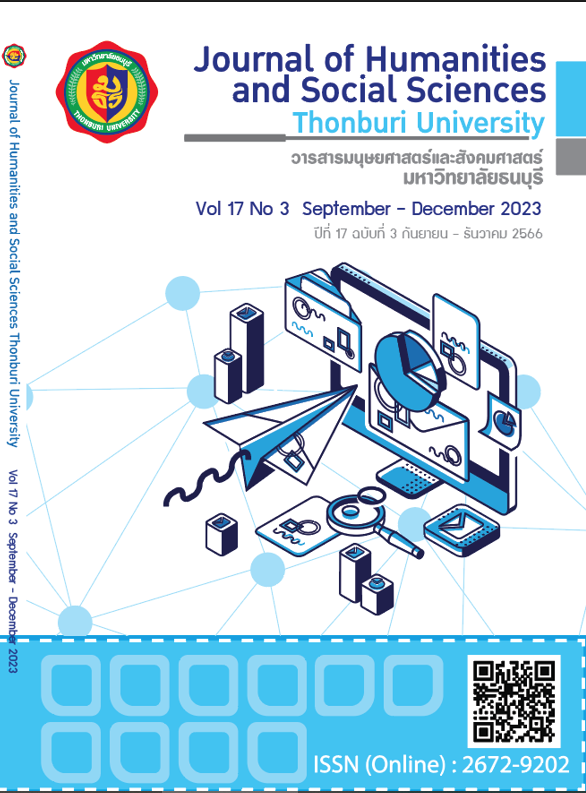องค์ประกอบสถานศึกษาอาชีวศึกษาเอกชนสู่การเป็นองค์การแห่งการเรียนรู้ยุคดิจิทัล สังกัดสำนักงานคณะกรรมการการอาชีวศึกษา
คำสำคัญ:
องค์ประกอบ, สถานศึกษาอาชีวศึกษาเอกชน, การเป็นองค์การแห่งการเรียนรู้ยุคดิจิทัล, สังกัดสำนักงานคณะกรรมการการอาชีวศึกษาบทคัดย่อ
การวิจัยนี้มีวัตถุประสงค์เพื่อ 1) ศึกษาองค์ประกอบสถานศึกษาอาชีวศึกษาเอกชนสู่การเป็นองค์การแห่งการเรียนรู้ยุคดิจิทัล สังกัดสำนักงานคณะกรรมการการอาชีวศึกษา 2) วิเคราะห์องค์ประกอบเชิงยืนยันสถานศึกษาอาชีวศึกษาเอกชนสู่การเป็นองค์การแห่งการเรียนรู้ยุคดิจิทัล สังกัดสำนักงานคณะกรรมการการอาชีวศึกษา โดยการสอบถามผู้บริหารสถานศึกษาอาชีวศึกษาจำนวน 205 คน เครื่องมือที่ใช้ในการวิจัย ได้แก่ แบบสอบถาม มีค่าความเชื่อมั่น .97 สถิติที่ใช้ในการวิเคราะห์ข้อมูล ได้แก่ ค่าเฉลี่ย ค่าส่วนเบี่ยงเบนมาตรฐาน การวิเคราะห์เนื้อหา การวิเคราะห์องค์ประกอบเชิงยืนยัน (Confirmatory Factor Analysis) ผลการวิจัยพบว่า 1. องค์ประกอบการเป็นองค์การแห่งการเรียนรู้ยุคดิจิทัล มี 5 องค์ประกอบ ได้แก่ 1) ด้านบุคคลแห่งการรอบรู้ 2) ด้านแบบแผนความคิด 3) ด้านการมีวิสัยทัศน์ร่วม 4) ด้านการเรียนรู้ร่วมกันเป็นทีม และ 5) ด้านการคิดอย่างเป็นระบบ ผลการตรวจสอบความสอดคล้องกลมกลืนของโมเดลการวิเคราะห์องค์ประกอบเชิงยืนยันองค์การแห่งการเรียนรู้ยุคดิจิทัล สังกัดสำนักงานคณะกรรมการการอาชีวศึกษา สอดคล้องกับข้อมูลเชิงประจักษ์ โดยมีค่าไค-สแควร์ ( x2 เท่ากับ 5.646 ที่องศิสระ df เท่ากับ 4 มีค่า p เท่ากับ .227) ซึ่งแตกต่างจากศูนย์อย่างไม่มีนับสำคัญ ค่าดัชนีความกลมกลืน (CFI) มีค่าเท่ากับ 1.000 ค่าดัชนีวัดความกลมกลืนที่ปรับแก้แล้ว (GFI) มีค่าเท่ากับ .989 ค่าดัชนีรากของค่าเฉลี่ยกำลังสองของส่วนเหลือ (RMR) มีเท่ากับ .006 ค่ารากของค่าเฉลี่ยกำลังสองของความคาดเคลื่อนโดยประมาณ (RMSEA) เท่ากับ 0.045 และ ค่า NFI = .993
เอกสารอ้างอิง
จุมพล หนิมพานิช. (2556). การบริหารและการพัฒนาองค์การ. นนทบุรี: มหาวิทยาลัยสุโขทัยธรรมาธิราช.
สํานักงานคณะกรรมการการอาชีวศึกษา. (2555). นโยบาย เป้าหมาย ยุทธศาสตร์การผลิตและพัฒนากําลังคนอาชีวศึกษาสู่สากล พ.ศ. 2555-2569. กรุงเทพฯ: สํานักงานฯ.
สำนักงานคณะกรรมการการศึกษาแห่งชาติ. (2542). พระราชบัญญัติการศึกษาแห่งชาติ พ.ศ. 2542 และที่แก้ไขเพิ่มเติม (ฉบับที่ 2) พ.ศ. 2545. กรุงเทพฯ: สำนักงานฯ.
สุนทรพจน์ ดำรงค์พานิช. (2555). โปรแกรม Mplus กับการวิเคราะห์ข้อมูลทางพฤติกรรมศาสตร์และสังคมศาสตร์. มหาสารคาม: สำนักพิมพ์มหาวิทยาลัยมหาสารคาม.
อัญชลี เหลืองศรีชัย. (2564, พฤษภาคม - สิงหาคม). การเป็นองค์กรแห่งการเรียนรู้ในยุคดิจิทัลตามความคิดเห็นของบุคลากร ในสังกัดอาชีวศึกษาจังหวัดปทุมธานี. วารสารมนุษยศาสตร์และสังคมศาสตร์ มหาวิทยาลัยราชพฤกษ์, 7(2), 170-186.
Cheng & Ching-wen. (2009). A Study of the Current Learning Organization Profile to Elementary Schools at Pingtung Country. Taiwan. Academy of Business: Cambridge.
Garvin, D.A. (1993). Building a Learning Organization. Harvard Business Review, 71(4).
Kaiser, S. M. (2000). Mapping the Learning Organization: Exploring A Model of Organizational Learning. Dissertation for the Degree of Doctor of Philosophy, Louisiana State University.
Likert, Rensis. (1967). “The Method of Constructing and Attitude Scale”, Reading in Attitude Theory and Measurement. P.90-95. Fishbeic, Matin, Ed. New York : Wiley & Son.
Marquardt, M. J. & Reynolds, A. (1994). The global learning organization. New York: Irwin.
Senge, P. M. (1990). The fifth discipline :The art and practice of the learning organization. London: Century Press.
Yamane, T. (1973). Statistics: Introductory analysis. Tokyo: Harper International.
Youzbashi, & Mohammadi. (2012). An Investigation into the Realization Dimension of Learning Organization. rocedia –Social and Behavioral Sciences, 90-92.
Translated Thai References
Chumpol, N. (2013). Organizational management and development. Nonthaburi: Sukhothai Thammathirat Open University. (in Thai)
Damrongpanich, Sumpot. (2012). Mplus program and behavioral science and social science data analysis. Mahasarakham: Mahasarakham University Press. (in Thai)
Liangsriachai, A. (2021, May - August). The Learning Organization in the Digital Era According to the Opinionsof Personnel under Vocational Education in Pathumthani Province. Journal of Humanities and Social Sciences, Ratchapruek University,7(2), 170-186. (in Thai)
Office of the National Education Commission. (1999). National Education Act 1999 and its amendments (2nd edition) 2002. Bangkok: Office. (in Thai)
Office of the Vocational Education Commission. (2012). Policies, goals, production strategies and vocational education manpower development towards the international level 2012-2026. Bangkok: Office of the Vocational Education Commission. (in Thai)
ดาวน์โหลด
เผยแพร่แล้ว
รูปแบบการอ้างอิง
ฉบับ
ประเภทบทความ
สัญญาอนุญาต
ลิขสิทธิ์ (c) 2023 Yaovaret Matawong

อนุญาตภายใต้เงื่อนไข Creative Commons Attribution-NonCommercial-NoDerivatives 4.0 International License.
ผลงานที่ปรากฎในวารสารฉบับนี้เป็นลิขสิทธิ์เฉพาะส่วนบุคคลของผู้เขียนซึ่งต้องรับผิดชอบต่อผลทาง กฎหมายที่อาจเกิดขึ้นได้และไม่มีผลต่อกองบรรณาธิการ






